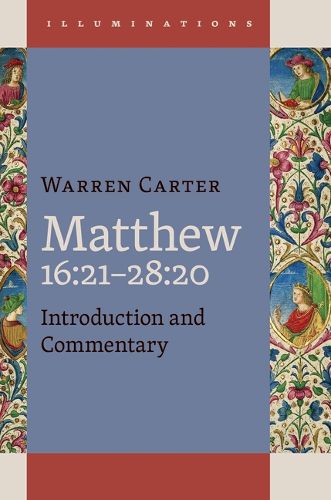Readings Newsletter
Become a Readings Member to make your shopping experience even easier.
Sign in or sign up for free!
You’re not far away from qualifying for FREE standard shipping within Australia
You’ve qualified for FREE standard shipping within Australia
The cart is loading…






An insightful commentary on the Gospel of Matthew that focuses on historical context and reception history Building on decades of focused work on the first Gospel, Warren Carter brings the fruit of that research to bear in a tour de force of historical insight and methodological rigor. Within this remarkable two-volume commentary, Carter situates the Gospel of Matthew within the context of Jewish traditions and negotiations of Roman imperialism after the destruction of Jerusalem in 70 CE. He positions the Gospel as illuminating how a community of Jesus-followers constantly navigates Roman power. He pays particular attention to Jesus's strategies for dealing with Roman rule, showing how Jesus alternately replicates it, accommodates it, resists it, and develops a way of life committed to the empire of God. In addition to examining the Gospel of Matthew in its historical and social context, Carter shines new light on instances of the book's reception, illustrating how scholars have interpreted it from the era of the early church up to the present. This fascinating commentary is an essential and distinctive resource for New Testament scholars and students of theology.
$9.00 standard shipping within Australia
FREE standard shipping within Australia for orders over $100.00
Express & International shipping calculated at checkout
Stock availability can be subject to change without notice. We recommend calling the shop or contacting our online team to check availability of low stock items. Please see our Shopping Online page for more details.
An insightful commentary on the Gospel of Matthew that focuses on historical context and reception history Building on decades of focused work on the first Gospel, Warren Carter brings the fruit of that research to bear in a tour de force of historical insight and methodological rigor. Within this remarkable two-volume commentary, Carter situates the Gospel of Matthew within the context of Jewish traditions and negotiations of Roman imperialism after the destruction of Jerusalem in 70 CE. He positions the Gospel as illuminating how a community of Jesus-followers constantly navigates Roman power. He pays particular attention to Jesus's strategies for dealing with Roman rule, showing how Jesus alternately replicates it, accommodates it, resists it, and develops a way of life committed to the empire of God. In addition to examining the Gospel of Matthew in its historical and social context, Carter shines new light on instances of the book's reception, illustrating how scholars have interpreted it from the era of the early church up to the present. This fascinating commentary is an essential and distinctive resource for New Testament scholars and students of theology.